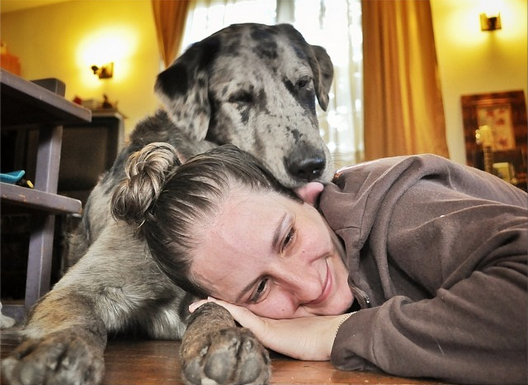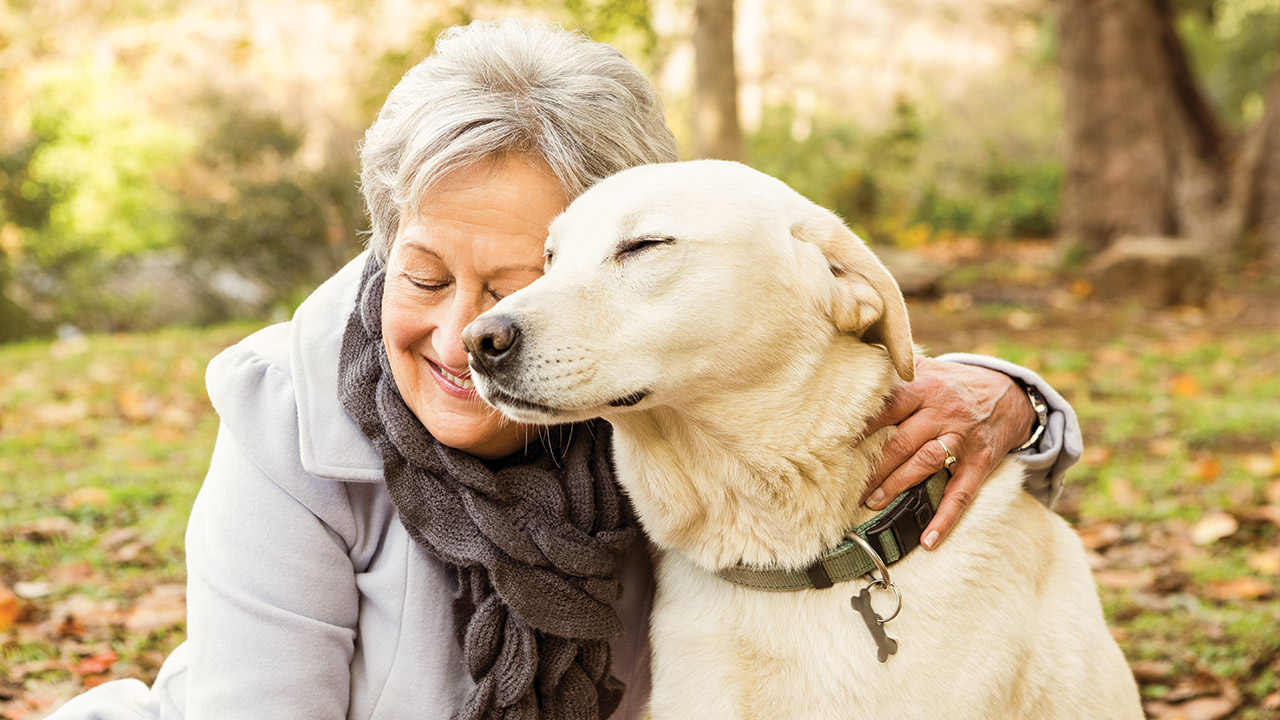How Caring for Pets can Help You Deal with Depression, Anxiety, and Stress
If you've ever owned a pet, you already know how much fun and affection they can bring. But did you know that pets also come with some pretty powerful mental and physical health benefits? Dogs in particular can reduce stress, anxiety, and depression, ease loneliness, encourage exercise and playfulness, and even improve your cardiovascular health. Caring for a dog can help children grow up more secure and active or provide valuable companionship for older adults. Perhaps most importantly, though, a dog can add real joy and unconditional love to your life.

How do dogs improve mood and health?
More than any other animal, dogs have evolved to become acutely attuned to humans and our behavior and emotions. While dogs are able to understand many of the words we use, they’re even better at interpreting our tone of voice, body language, and gestures. And like any good human friend, a loyal dog will look into your eyes to gauge your emotional state and try to understand what you’re thinking and feeling (and to work out when the next walk or treat might be coming, of course).
While most dog owners are clear about the immediate joys that come with sharing their lives with canine companions, many remain unaware of the physical and mental health benefits that can also accompany the pleasure of playing with or snuggling up to a furry friend. It’s only recently that studies have begun to scientifically explore the benefits of the human-animal bond. The American Heart Association has linked the ownership of pets, especially dogs, with a reduced risk for heart disease and greater longevity.

Studies have also found that:
- Dog owners are less likely to suffer from depression than those without pets.
- People with dogs have lower blood pressure in stressful situations than those without pets. One study even found that when people with borderline hypertension adopted dogs from a shelter, their blood pressure declined significantly within five months.
- Playing with a dog or cat can elevate levels of serotonin and dopamine, which calm and relax.
- Pet owners have lower triglyceride and cholesterol levels (indicators of heart disease) than those without pets.
- Heart attack patients with dogs survive longer than those without.
- Pet owners over age 65 make 30 percent fewer visits to their doctors than those without pets.
One of the reasons for these therapeutic effects is that dogs (and cats) fulfill the basic human need to touch. Even hardened criminals in prison have shown long-term changes in their behavior after interacting with dogs, many of them experiencing mutual affection for the first time. Stroking, hugging, or otherwise touching a loving animal can rapidly calm and soothe us when we’re stressed or anxious. The companionship of a pet can also ease loneliness, and most dogs are a great stimulus for healthy exercise, which can substantially boost your mood and ease depression.
How can dogs help you make healthy lifestyle changes?

Adopting healthy lifestyle changes plays an important role in easing symptoms of depression, anxiety, stress, bipolar disorder, and PTSD. Caring for a dog can help you make healthy lifestyle changes by:
- Increasing exercise. Taking a dog for a walk, hike, or run are fun and rewarding ways to fit healthy daily exercise into your schedule. Studies have shown that dog owners are far more likely to meet their daily exercise requirements—and exercising every day is great for the animal as well. It will deepen the connection between you, eradicate most behavior problems in dogs, and keep your pet fit and healthy.
- Providing companionship. Companionship can help prevent illness and even add years to your life, while isolation and loneliness can trigger symptoms of depression. Caring for a living animal can help make you feel needed and wanted, and take the focus away from your problems, especially if you live alone. Most dog and cat owners talk to their pets, some even use them to work through their troubles. And nothing beats loneliness like coming home to a wagging tail and wet kisses.
- Helping you meet new people. Dogs can be a great social lubricant for their owners, helping you start and maintain new friendships. Dog owners frequently stop and talk to each other on walks, hikes, or in a dog park. Dog owners also meet new people in pet stores, clubs, and training classes.
- Reducing anxiety. The companionship of a dog can offer comfort, help ease anxiety, and build self-confidence for people anxious about going out into the world. Because dogs live in the moment—they don’t worry about what happened yesterday or what might happen tomorrow—they can help you become more mindful and appreciate the joy of the present.
- Adding structure and routine to your day. Dogs require a regular feeding and exercise schedule. Having a consistent routine keeps a dog balanced and calm—and it can work for you, too. No matter your mood—depressed, anxious, or stressed—one plaintive look from your dog and you’ll have to get out of bed to feed, exercise, and care for your pet.
- Providing sensory stress relief. Touch and movement are two healthy ways to quickly manage stress. Stroking a dog lowers blood pressure and can help you quickly feel calmer and less stressed.
Get a dog, lose weight
Numerous studies have linked dog ownership to weight loss:
- One year-long study found that walking an overweight dog helped both the animals and their owners lose weight. Researchers found that the dogs provided support in similar ways to a human exercise buddy, but with greater consistency and without any negative influence.
- Public housing residents who walked therapy dogs for up to 20 minutes five days a week lost an average of 14.4 pounds in a year, without changing their diets.
- A third study found that people who got a dog walked 30 minutes more a week than they did before.
Dogs and the health benefits for older adults
As well as providing vital companionship, owning a dog can play an important role in healthy aging by:
- Helping you find meaning and joy in life. As you age, you’ll lose things that previously occupied your time and gave your life purpose. You may retire from your career or your children may move far away. Caring for a dog can bring pleasure and help boost your morale, optimism, and sense of self-worth. Choosing to adopt a dog from a shelter, especially an older dog, can add to the sense of fulfillment, knowing that you’ve provided a home to a pet that may otherwise have been euthanized.
- Staying connected. Maintaining a social network isn’t always easy as you grow older. Retirement, illness, death, and relocation can take away close friends and family members. And making new friends can get harder. Dogs are a great way for older adults to spark up conversations and meet new people.
- Boosting vitality. You can overcome many of the physical challenges associated with aging by taking good care of yourself. Dogs, and to a lesser degree cats, encourage playfulness, laughter, and exercise, which can help boost your immune system and increase your energy.

Dogs and adults with Alzheimer’s disease or dementia
As part of the disease, Alzheimer’s patients may exhibit a variety of behavioral problems, many related to an inability to deal with stress.
- Research at the University of California at Davis concluded that Alzheimer's patients suffer less stress and have fewer anxious outbursts if there is a dog or cat in the home.
- Dogs can provide a source of positive, nonverbal communication. The playful interaction and gentle touch from a well-trained, docile dog can help soothe an Alzheimer’s patient and decrease aggressive behavior.
- In many cases a patient’s problem behavior is a reaction to the stressed response of the primary caretaker. Pets can help ease the stress of caregivers.
Dogs and the health benefits for children

Not only do children who grow up with pets have less risk of allergies and asthma, many also learn responsibility, compassion, and empathy from having a dog or cat.
- Unlike parents or teachers, pets are never critical and don’t give orders. They are always loving and their mere presence at home can help provide a sense of security in children. Having an ever-present dog can help ease separation anxiety in children when mom and dad aren’t around.
- Having the love and companionship of a loyal dog can make a child feel important and help him or her develop a positive self-image.
- Kids who are emotionally attached to their dog are better able to build relationships with other people.
- Studies have also shown that dogs can help calm hyperactive or overly aggressive kids. Of course, both the dog and the child need to be trained to behave appropriately with each other.
Children and adults alike can benefit from playing with dogs, which can be both a source of calmness and relaxation, as well as a source of stimulation for the brain and body. Playing with a dog can even be a doorway to learning for a child. It can stimulate a child’s imagination and curiosity. The rewards of training a dog to perform a new trick, for example, can teach kids the importance of perseverance. Caring for a furry friend can also offer another benefit to a child: immense joy.
Children with learning disorders and other challenges
Some children with autism or other learning difficulties are better able to interact with pets than people. Autistic children often rely on nonverbal cues to communicate, just as dogs do. And learning to first connect with a dog may even help an autistic child in his or her interactions with people.
- Pets can help children with learning disabilities learn how to regulate stress and calm themselves, making them better equipped to overcome the challenges of their disorder.
- Playing and exercising with a dog can help a child with learning disorders stay alert and attentive throughout the day. It can also be a great antidote to stress and frustration caused by the learning disability.
Owning a dog is a major commitment
A dog is not a miracle cure for mental illness. Owning a dog is beneficial and comforting only for those who love and appreciate domestic animals and have the time and money to keep a dog happy and healthy. If you’re simply not a “dog person,” dog ownership is not going to provide you with any health benefits or improve your life. For some people, owning a cat requires less time and attention, and can be just as rewarding.
Even if you love dogs, it’s important to understand everything that caring for a dog entails. Owning a dog is a commitment that will last the lifetime of the animal, perhaps 10 or 15 years. And at the end of that commitment, you’ll face the grief and mourning that comes with losing a beloved companion.
Other drawbacks to owning a dog are:
- Dogs require time and attention. As any dog owner will tell you, there’s nothing beneficial to your mental health about coming home to a dog who’s has been locked up in the house on his own all day long. Dogs need daily exercise and mental stimulation to stay calm and well-balanced.
- Owning a dog can curb some of your social activity. A dog can only be left alone for a limited time. By training your dog, you’ll be able to take him with you to visit friends, run errands, or sit outside a coffee shop, for example, but you won’t be able to leave for a spur of the moment weekend away without arranging care for your pet first.
- Dogs can be destructive. Any dog can have an occasional accident at home, especially if he’s sick or been left alone for too long, while some dogs are prone to chewing shoes or destroying cushions. Training and exercise can help eradicate negative, destructive behavior, but they remain common in dogs left alone for long periods of time.
- Dogs require responsibility. Most dogs, regardless of size and breed, are capable of inflicting injury on people if not handled responsibly by their owners. Dog owners need to be alert to any danger, especially around children.
- Dogs carry health risks for some people. While there are some diseases that can be transmitted from dogs to their human handlers, allergies are the most common health risk of dog ownership. If you or a family member has been diagnosed with a pet allergy, carefully consider whether you can live with the symptoms before committing to dog ownership. Also consider that some friends or relatives with allergies may no longer be able to visit your home if you have a dog.
Deciding on the qualities you want in a dog
If you’ve never owned a dog before, it may not be obvious what type of dog will suit your lifestyle and living arrangements. Following are some important questions:
- Do you have an active household with young children, disabled people, or frail elderly people? If so, you’ll want a gentle dog. In an active household, avoid toy breeds; they may get trampled by youngsters and are prone to barking and biting. Large or rambunctious dogs could accidentally knock over a small child or adult who is unsteady on his or her feet.
- How much shedding can you tolerate, and how much grooming can you afford? Most dogs shed fur to some extent, especially dogs with double coats like chows and Akitas, which can be messy and provoke allergy attacks in some people. Some dogs, such as poodles and poodle mixes like Labradoodles, are bred to be nonshedding but may require a lot of professional grooming, so you’ll need to factor in the time and expense of owning such a dog.
- How active do you plan to be with the dog? This is one of the most important questions you can ask about a potential dog (and yourself). If you’re not terribly active, don’t get a dog that needs a lot of exercise, such as a golden retriever or husky. On the other hand, if you’d like a dog to run with, choose an animal that can tolerate lots of exercise such as a pointer or Border collie. Inevitably, a dog that gets enough exercise will behave better in the home and be less prone to anxiety and its potentially destructive consequences.
- Who will take care of the dog? Although children will often beg for a dog and reassure parents that they will be the primary caretakers, the responsibility typically falls to the adults in a household. (And even if a child does care for the pet, you must supervise him or her.) The bottom line: if you and your family members aren’t prepared to feed and walk a dog, you shouldn’t get one.
- How long will the dog be alone on a daily basis? Not only do dogs need to go out to eliminate every eight hours or so (or more often than that if they’re puppies or old and sick), but they can also suffer from loneliness and anxiety if isolated. You may have to hire a dog walker or take the dog to doggie day care.
- Do you have other animals in the home, and will they get along with your new pet? Some dogs and cats will not tolerate a new animal in the home, so be sure to assess your current pets’ predisposition to new family members before you commit.
- Do you live in the right size and kind of home for the dog you want to acquire? Big, rowdy Labrador retrievers and hyper Border collies won’t do well in tiny apartments and need plenty of space to run and play, especially when they’re young. But size is not always a good indicator of energy level or adaptability to a small house. Many large dogs are better suited to apartment life than are the high-energy but small Jack Russell Terriers, for example.
- Do you want a puppy or a full-grown dog? Starting from scratch with a puppy can be a tremendous joy, but also a tremendous amount of work, so you want to be sure you’ll have time to properly housebreak, socialise, and train a puppy. If you can’t deal with a puppy, a housebroken adult dog is often a better choice.





